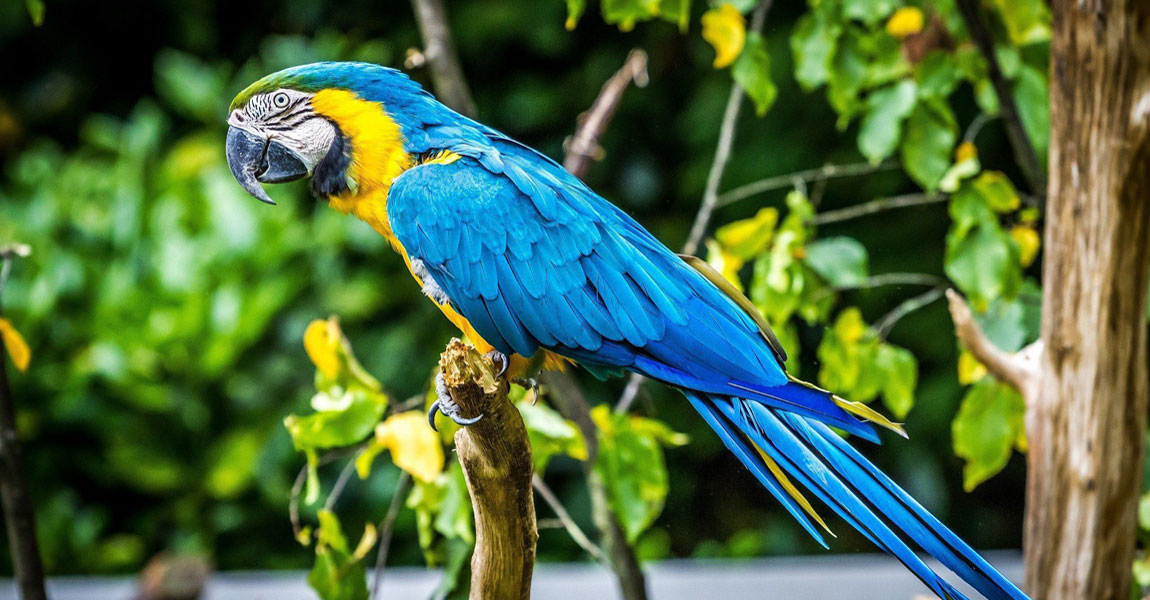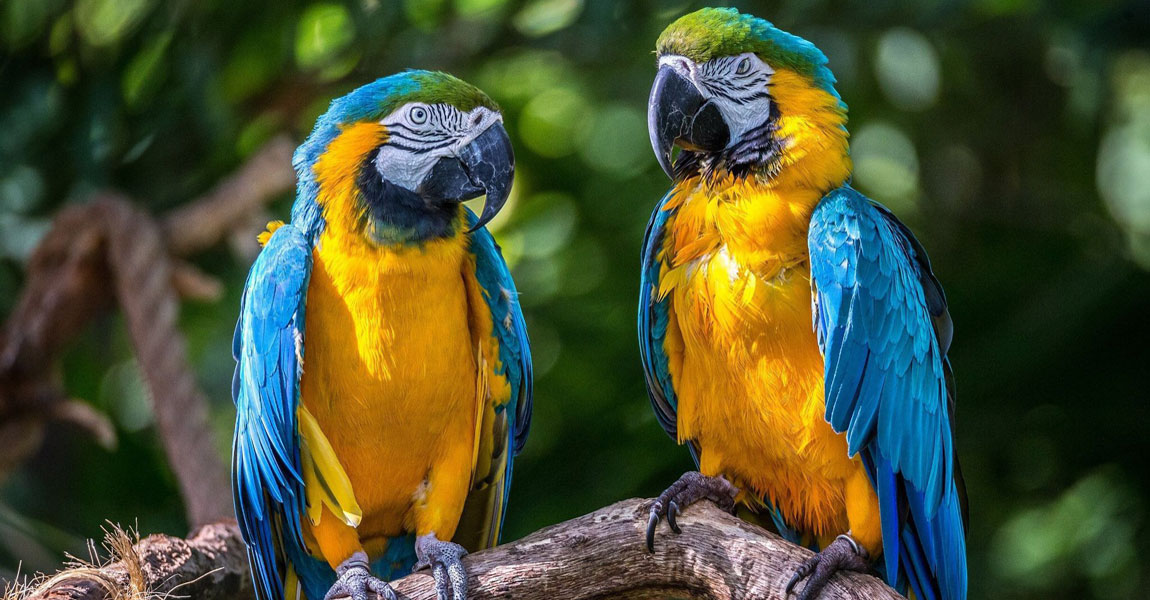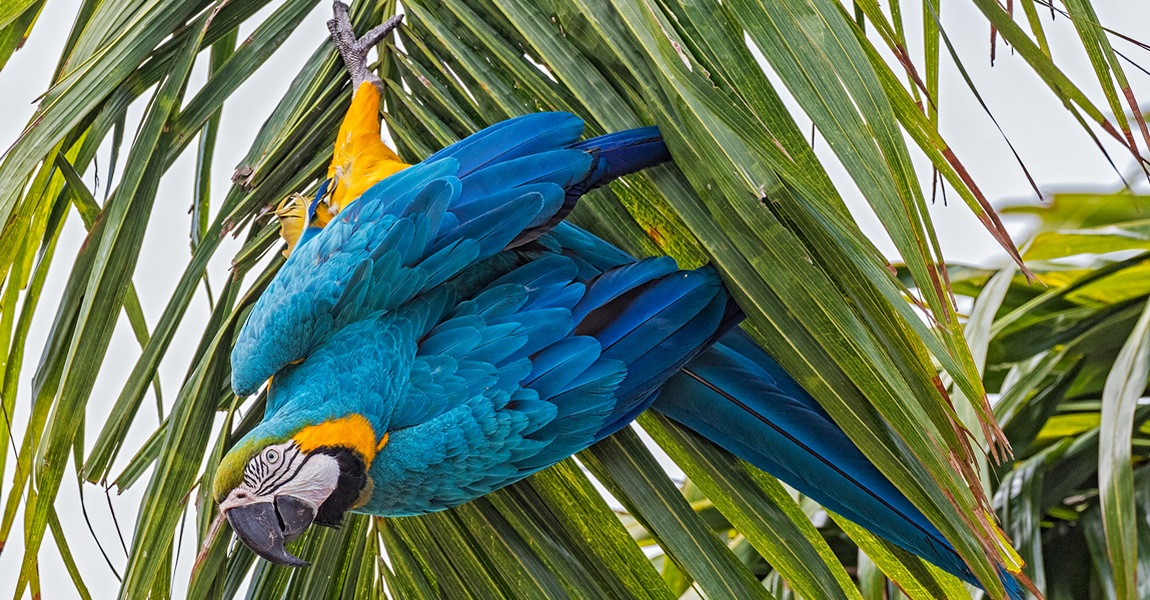Beautiful, vivacious, the macaw is loved as a companion around the world. Having a macaw as a pet can feel a bit like having a little sliver of the tropics inside your home. Vibrant color patterns and stunning markings make each macaw seem like a one-of-a-kind painting. The feather patterns of macaws are as unique as human fingerprints! Macaws are characterized by their long tails and large beaks. Did you know that some macaws have cheeks that blush to indicate mood? This is just one of many fun pieces of trivia to know about beautiful, exotic macaws.
Macaws hail from some of the most beautiful tropical locales on the planet. Macaws are native to Mexico, Central America, and South America. There is no denying that Macaws are in a class of their own. However, these birds belong to the parrot family. One characteristic they have in common with all parrots is the way their first and fourth toes point backward. This feature allows macaws to grip tree branches without slipping.
It’s only natural to want to be able to properly take care of your macaw once you welcome it into your home. That’s why learning about lifestyle needs, nutritional needs and habits of macaws are so important. Take a look at some important things to consider before bringing a macaw into your home.
What things should I consider before buying a macaw?
Macaws are very social and intelligent birds. This intelligence is what makes them such great companions. Intelligence is also what makes them a bit complicated. The first thing to know when considering a macaw as a pet is that these birds are large. The average adult macaw reaches a height that ranges somewhere between 28 inches and 38 inches. It’s not uncommon for some macaws to grow even taller. That means that a standard birdcage simply won’t do.
How big should a macaw cage be?
A macaw requires a cage that is at least 30 inches deep by about 40 inches wide. Many macaw owners opt for cages that are much larger than that. The general rule is that larger is better when it comes to macaw cages. The cage requirements for macaws can be limiting for some people. Not all homes and apartments are large enough to comfortably house a macaw cage. This is something you need to take a look at before you bring a macaw home.
Are you comfortable with loud noises?
The reality is that you need to be comfortable with having noise in your home if you’re going to become a macaw owner. It is in a macaw’s nature to communicate with members of its flock from a distance. You will essentially become your macaw’s flock once you become a macaw owner. That means that your macaw will feel the need to communicate with you from time to time. A macaw’s version of communication will often sound like a very loud screech!Most people love the sounds that are made by their macaws. These sounds can make you feel like you’re relaxing deep in the Amazon when you’re fixing dinner or watching television on your couch. However, having a macaw in your home could become problematic if you cannot tolerate loud sounds for any reason.
People who require uninterrupted sleep, have babies in the home or have children who may become alarmed at the sound of a screeching macaw may not be suited for this type of parrot. The decibel range for a macaw’s squawk is similar to the decibel range for a jackhammer. Each macaw is different. Some are very chatty. Reserved macaws will save their squawks for the times when they need to tell you something. However, you won’t know just how disruptive or comforting the sound of your macaw will be until you live with it in your home for a while.
A macaw is a friend for life
It’s also important to know that taking a macaw into your home is a long-term commitment. The average macaw has a lifespan of between 50 years and 70 years! That means you will need to have a plan in place for the long-term care of your macaw. Many macaw owners set up trust funds or wills to cover the costs and care of their pet macaws.Macaws are social birds. This is precisely why many people choose them. However, you must be prepared for the fact that your pet macaw will require much attention. Macaws are loyal. A macaw in the wild will stay with a single flock for life. You can expect your macaw to become very attached to you. Macaws require interaction consistently.
Are you ready to provide the attention a macaw needs?
Having a macaw means agreeing to give your bird attention every day. You will also need to find ways to include your bird in your daily routine as much as possible. A lonely macaw is an unhappy macaw. A macaw that is feeling isolated often becomes destructive and unruly. Besides, a macaw may become very loud and hard to control if it feels ignored.The high intelligence of macaws is one of the reasons why they require so much interaction and stimulation. An unhappy or bored macaw may begin plucking its feathers. This is a sign that your bird is feeling neglected. Feather plucking can be quite dangerous for the health of a bird. It will be important to consult your avian veterinarian if you observe feather plucking. Of course, there are some real bright spots when it comes to owning an intelligent bird. Macaws are highly trainable. They can easily learn to mimic sounds and actions.
What else do I need when considering whether or not to buy a macaw?
You already know that you will need to find space for a large cage if you welcome a macaw into your home. Another thing to consider before bringing a macaw into your home is that you may have to change some aspects of your lifestyle to accommodate your new bird. Macaws are highly sensitive when it comes to environmental factors. The lungs of macaws are particularly sensitive. As a result, many household items that you probably don’t give much thought to can cause serious health issues for a macaw. Simple things like candles, cleaning products, and air fresheners can cause respiratory problems.It is not recommended for macaws to live in homes where people smoke cigarettes or other tobacco products. Even things like Teflon-coated pans and stain-resistant carpeting can be lethal for macaws, please do not take this lightly. Bird-proofing your home will be essential if you think that your macaw will be able to fly from its cage at any point. Glass windows that can attract macaws, fabrics that could catch the claws of macaws and heavy metals that could be ingested by macaws all pose risks. It will be important to speak with your avian vet about any potential hazards that could be in your home once you are a proud bird owner.





